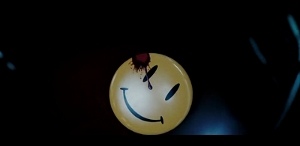 As if anyone doesn’t already know, Watchmen is an award-winning, twelve-issue comic book created by the writer/magician Alan Moore and the artist Dave Gibbons, originally published by DC Comics in that dark and distant year of your lord, 1986. Steeped in Reagan-era pessimism and dreams of nuclear holocaust, the book did more for superhero storytelling than all Frank Miller’s work combined. It dragged the genre, kicking and screaming, into the late twentieth century, disguising its social relevance with a baroque self-reflexiveness now recognized as the hallmark of comic’s Iron Age.
As if anyone doesn’t already know, Watchmen is an award-winning, twelve-issue comic book created by the writer/magician Alan Moore and the artist Dave Gibbons, originally published by DC Comics in that dark and distant year of your lord, 1986. Steeped in Reagan-era pessimism and dreams of nuclear holocaust, the book did more for superhero storytelling than all Frank Miller’s work combined. It dragged the genre, kicking and screaming, into the late twentieth century, disguising its social relevance with a baroque self-reflexiveness now recognized as the hallmark of comic’s Iron Age.
It is also, now, with the release of the extra-super-duper-special Ultimate Edition, a three and a half hour, suburban sprawl of a film, directed by MTV alum Zack Snyder. Reviewers love to crow about Watchmen‘s pivotal nature, seeing its reconstruction into a can’t-help-but-call-it-“epic” film as a watershed moment for superherodom. These contentions are as accurate as they are illiterate, removing the story from its proper place and time. An intelligent critique of this film has not and (I’ll obviously argue) cannot be written without a true understanding of the context that birthed Watchmen in the first place.
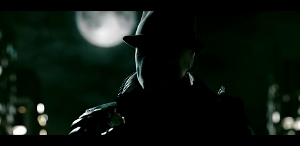 In 1985, a young gentleman writer from Northampton emerged from his revolutionary work penning Swamp Thing with a proposal: take a clutch of old Charlton Comics characters recently bought and paid for by DC Comics (The Shield, the Question, Blue Beetle, Captain Atom), and set them in a reality one hundred eighty degrees away from “the Big Two” company’s traditional superhero worlds. Utilizing the grammar and syntax of a murder mystery, Watchmen is a guided tour through that reality. An examination, almost sociological in scope, of how superheros warped the fabric of the twentieth century.
In 1985, a young gentleman writer from Northampton emerged from his revolutionary work penning Swamp Thing with a proposal: take a clutch of old Charlton Comics characters recently bought and paid for by DC Comics (The Shield, the Question, Blue Beetle, Captain Atom), and set them in a reality one hundred eighty degrees away from “the Big Two” company’s traditional superhero worlds. Utilizing the grammar and syntax of a murder mystery, Watchmen is a guided tour through that reality. An examination, almost sociological in scope, of how superheros warped the fabric of the twentieth century.
It begins with a murder on October 12th, 1985. The victim is one Edward Blake, a.k.a. the Comedian. If he were a rapper, he could rightly claim the title “OG,” having begun his masked vigilantism in the 1930s. As in our reality, World War II inaugurated a brief Golden Age for America’s masked avengers. But, as with so much else, the social upheavals of the fifties, sixties and seventies eventually triggered a backlash. In 1978 Congress, no-doubt cowed by then-three-term President Richard M. Nixon, passed the Keene Act, outlawing all “masks”…save those authorized by Nixon’s government. The Comedian, who (it’s implied) has been doing dirty deeds for the Administration since he helped Tricky Dick win the Vietnam War, is one public “hero.” Dr. Manhattan (Billy Crudup), a nuclear scientist who “through a Terrible Accident” back in 1959, gained complete mental mastery of the quantum structure of the universe, is the other. By the mid-80s, Dr. Manhattan’s become the living lynchpin of America’s Cold War defense apparatus. The remaining “masks” have disappeared into the general population, safely ensconced in their secret identities…save one lone sociopath whom we’ll spent most of our time with, named Rorschach (Jackie Earle Haley).
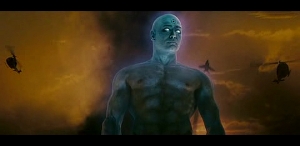 A virulent right-winger with a black-and-white view of the world and an interior monologue to make Molly Bloom look tongue-tied, Rorschach immediately suspects the Comedian’s death is part of some larger plot against masks past and present. His former partner in crime-fighting, Dan Dreiberg (Patrick Wilson), who went by the name Nite Owl before he retired, dismisses this theory as “a little paranoid.”
A virulent right-winger with a black-and-white view of the world and an interior monologue to make Molly Bloom look tongue-tied, Rorschach immediately suspects the Comedian’s death is part of some larger plot against masks past and present. His former partner in crime-fighting, Dan Dreiberg (Patrick Wilson), who went by the name Nite Owl before he retired, dismisses this theory as “a little paranoid.”
Undaunted, Rorschach pursues his investigations with the same lonely doggedness that’s driven him into the night these past seven years, warning Dr. Manhattan and Manhattan’s sort-of love interest, Laurie Jupiter (Malin Akerman), who once went by the handle of Silk Spectre. Dreiberg, despite his misgivings, spreads the “mask killer” word to billionaire industrialist/“smartest man on the planet” Adrian Veidt (Matthew Goode), once known as Ozymandias. Veidt cashed in on his formerly-secret identity big time, and his perch at the top of the corporate pyramid affords a wider perspective on the world scene. The Soviet Union is making moves toward Afghanistan, President Nixon is making bellicose speeches (being himself, in other words), and both superpowers are amassing enough nuclear arms to destroy the world hundreds of times over…even if Dr. Manhattan does manage to “stop” 99.9% of them.
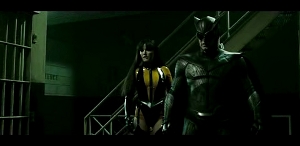 And when Dr. Manhattan’s former lover, Janey Slater (Laura Mennell) accuses him of giving her cancer during a nationally televised interview, the former-nuclear-scientist-turned-demigod teleports himself into self-imposed exile on Mars. With their “walking nuclear deterrent” gone, the Nixon Administration falls back on the old “Madman Theory,” escalating brinksmanship to the point where Armageddon seems inevitable. Soon, Rorschach is neutralized as well, captured at the scene of a murder he did not commit, so it’s up to Dan and Laurie to head off this Apocalypse through the rediscovery of their costumed identities (and the healing power of casual sex).
And when Dr. Manhattan’s former lover, Janey Slater (Laura Mennell) accuses him of giving her cancer during a nationally televised interview, the former-nuclear-scientist-turned-demigod teleports himself into self-imposed exile on Mars. With their “walking nuclear deterrent” gone, the Nixon Administration falls back on the old “Madman Theory,” escalating brinksmanship to the point where Armageddon seems inevitable. Soon, Rorschach is neutralized as well, captured at the scene of a murder he did not commit, so it’s up to Dan and Laurie to head off this Apocalypse through the rediscovery of their costumed identities (and the healing power of casual sex).
None of which even begins to describe the complex, fractal geometry of Watchmen’s plot. Its narrative, culled from twelve books worth of comics, is digressive in the extreme. The first half of the film flails about identifying its cast of protagonists, attempting to successfully flesh each of them out. The result is occasionally rambling, jerky, and downright weird when compared to Snyder’s last epic failure, 300. That, at least, had the advantage of being a straightforward (warmongering, ahistorical, and racist, but straightforward) narrative. Something inside me shuddered and died when I heard Snyder caught this golden snitch. His brainless stylistics, love of slow motion, and relative inexperience with feature-length pictures led me to expect the worst.
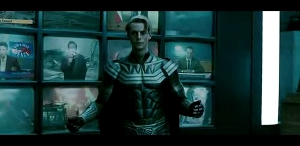 In that sense, I owe ol’ Zack an apology. That inexperience I feared may have saved this film, checking the destructive urges “visionary” directors frequently use to murder good stories in the name of “adapting” them. Most of the film is a Xerox of Dave Gibbon’s artwork, set it in motion by the press of a few million buttons. Too often that motion sloooows to a snail-on-Saturn’s pace…but eventually all those familiar, well-loved images lull you into a false sense of security with their apparent respect for the Source. Deviations creep in subtly, coming faster once the plot thickenith. Don’t tell me that wasn’t a conscious choice on somebody’s part. Goddamnit, Zack, you had me up until you cut Kitty Genovese out of picture. She’s not even mentioned in the Ultimate Edition which I’ll assume is the Whole Film since I’m damned sure not going to buy another copy again. I get that Rorschach’s atheism would never fly in an American theater (or past an American MPAA, for that matter—fascist, theocratic, thug-bunch that they are), but why cut out his Defining Element of Tragedy?
In that sense, I owe ol’ Zack an apology. That inexperience I feared may have saved this film, checking the destructive urges “visionary” directors frequently use to murder good stories in the name of “adapting” them. Most of the film is a Xerox of Dave Gibbon’s artwork, set it in motion by the press of a few million buttons. Too often that motion sloooows to a snail-on-Saturn’s pace…but eventually all those familiar, well-loved images lull you into a false sense of security with their apparent respect for the Source. Deviations creep in subtly, coming faster once the plot thickenith. Don’t tell me that wasn’t a conscious choice on somebody’s part. Goddamnit, Zack, you had me up until you cut Kitty Genovese out of picture. She’s not even mentioned in the Ultimate Edition which I’ll assume is the Whole Film since I’m damned sure not going to buy another copy again. I get that Rorschach’s atheism would never fly in an American theater (or past an American MPAA, for that matter—fascist, theocratic, thug-bunch that they are), but why cut out his Defining Element of Tragedy?
That’s nothing, though. Less than a nitpick, really. My real problem with the film stems from its source book’s success, not just with fans, but with comic book creators themselves. Whether they loved it or not, I’ll bet it’d be hard to find someone in the industry who hasn’t read Watchmen. If you’ve read even one superhero comic in the last twenty years, trust me, you’ve read a response to this one. As such, there is no way for me to see this film as anything other than a disappointment. Not that large of one, perhaps, but certainly large enough. Idiots who’ve ignored the last twenty years of comics can rant and rave all they want about this film’s “adult” themes and “mature” meditations on the proper use of power and its consequences. The rest of us are waiting patiently for someone, somewhere, to move the medium beyond knee jerk self-reflexivity…perhaps toward some new, beautiful Silver Age we were supposed to reach about twenty years ago.
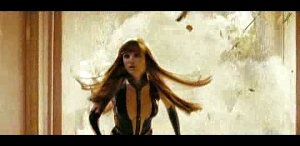 The actors, at least, carry it through and stave off complete disaffection. Crudup and Haley are absolutely perfect in their respective roles as uber- and untermechen. Wilson’s Nite Owl is blithely normal person who just so happens to be a superhero, such an able audience identification character screenwriters Alex Tse and David Hayter even give him a little extra speech at the end of the film, trying to tell us what to think. (God forbid a film let us make up our own damn mind, the way, say, a well-written comic book might, but never mind, back to the topic.) Akerman is the odd woman out, her Laurie much whinier than I’d like. I had the similar problem with the way her creators handled her in the book: a Love Interest and Afterthought, sharing a stage with the world’s end.
The actors, at least, carry it through and stave off complete disaffection. Crudup and Haley are absolutely perfect in their respective roles as uber- and untermechen. Wilson’s Nite Owl is blithely normal person who just so happens to be a superhero, such an able audience identification character screenwriters Alex Tse and David Hayter even give him a little extra speech at the end of the film, trying to tell us what to think. (God forbid a film let us make up our own damn mind, the way, say, a well-written comic book might, but never mind, back to the topic.) Akerman is the odd woman out, her Laurie much whinier than I’d like. I had the similar problem with the way her creators handled her in the book: a Love Interest and Afterthought, sharing a stage with the world’s end.
So I have little nitpicks with this film, but on the whole I say, okay. As three hour superhero epics go, it’s certainly no Dark Knight, but I’m glad it made all that lovely money. Maybe now that the suits know there’s a market for these kinds of stories (told in long-form, no less) someone will get the chance to tell a real mind-blower. Something a little more original?
![]()
![]()
![]()
![]()

I saw this movie last night. Since I’m not much of a comics fan, I’d only heard of the comic and its bare-bones plot. I’ve never read it. I’ve also never seen any of Zack Snyder’s other movies.
So here’s the take of a viewer who had no frame of reference related to the source material:
I understand that this movie is really faithful to the comic. That’s always appreciated, no matter what the source material is. But there’s one aspect where that faithfulness to a decades-old comic ROYALLY hurts the movie on both the intellectual and emotional levels: The We’re-All-Gonna-Die-Cuz-Of-World-War-3 bullshit. Back then, it was a common belief that it was gonna happen. When Reagan predicted a peaceful end to the Cold War before the 20th Century’s end, plenty of folks said that that was naive and stupid.
But today, there’s no disputing that Reagan was right and those paranoids were wrong. The Cold War DID end peacefully before the century was over, with Reagan and Gorbachev each giving the other credit for it in the sweetest political bromance in world history.
So when the movie in 2009 (or on my viewing in 2015) presents that WW3 paranoia with as much absolute dead-seriousness as it does, it is absolutely IMPOSSIBLE to get into the spirit of. When we learn of Ozymandias’ plan, instead of seeming like transcendentally cold logic, it seems like precisely what it is: Paranoia and naiveté. Sure, it’s delivered at speaking volume, but that doesn’t make it any less hysterical.
Even more embarrassing is that that paranoia and naivete comes from a character whom the movie specifically identifies more than once as “the smartest man in the world.”
Ummmmm……”Killing millions to save billions” doesn’t sound so smart when compared with the real-world solution of saving billions WITHOUT killing millions. Maybe in the 80s this seemed brilliant (to SOMEbody, anyway), but today, it just makes Ozymandias look like a dunce (and Dr. Manhattan, too, for buying into it).
That, to me, is what keeps me from calling this movie excellent. But I did dig the nifty mystery, I dug how well the movie fleshed out so many characters, I dug that they were thoroughly distinct from each other (except the Comedian and Rorschach didn’t seem to have much daylight between them except the Comedian being a nihilist and Rorschach being a law-and-order nihilist). I dug that the movie makes being a superhero seem like something you’d have to be a maladjusted wacko to want to do, and I dug that the movie made the Watchmen as a team seem homicidally dysfunctional.
I agree that the slo-mo was done to death. It doesn’t seem there to heighten the drama (except maaayyybe the death of the Comedian), it seems like its there solely to be Kewuhl. And it didn’t heighten the drama of the Comedian’s death TOO much to me because, since I didn’t read the comic, I don’t know who he was or what I was supposed to feel (and once I found out, I didn’t care much that he was murdered).
I also agree about the retired Nite Owl as audience identification figure. That’s PRECISELY what I was thinking! I sensed that this guy likely didn’t mind retiring one bit and didn’t have much trouble segueing into his new career. He’s the only ordinary character in the movie. And when there’s only one ordinary guy, that ordinariness becomes extraordinary. Neat!
I understand that Snyder recreates panels from the comics faithfully. I’m not surprised. This movie LOOKS like a comic book come to life.
I saw Rorschach and Nite Owl as Batman split in two. Rorschach is the angry vigilante half, and Nite Owl is the tech wizard half. Don’t know if that was the idea, but that’s what I noticed.
RANDOM THOUGHTS:
– Windows and porcelain break implausibly easily in this movie.
– The opening theme song just goes on and on, doesn’t it?
– The Eleanor Clift impersonator was absolutely PERFECT.
– All the online reviews I read make a big deal of Dr. M’s frontal nudity. I don’t know why. It was always in long shot. I barely noticed and never cared.
– I can see the need for crafting an alternate timeline, but I don’t see why it would necessitate a Nixon staying President into the 80s.
– The Nixon actor’s fake nose was so distracting I couldn’t pay attention to anything else when he was on screen.
– Silk Spectre’s mother was also wearing totally unconvincing old-age makeup.
– I wasn’t buying Dr. M’s 180-on-a-dime from Xtreme Above-It-All to getting involved simply because of what he learns about Silk Spectre’s geneology. If you’re gonna go to an absolute, either stay there or have an equally absolutist reason to return.
Funnily enough Lex Luthor even comments on how utterly idiotic Ozymandias’s plan was when they meet. He says “if you’re the smartest man on you’re planet I’d hate to meet the dumbest.”
Speaking of Doomsday Clock actually isn’t too bad. It’s not as good as watchmen but it does show a lot of respect for the themes (Johns characterized it as condemning the idea of abandoning love hope and epic storytelling but feels that since a lot of people focused on the surface grit they missed the point.)